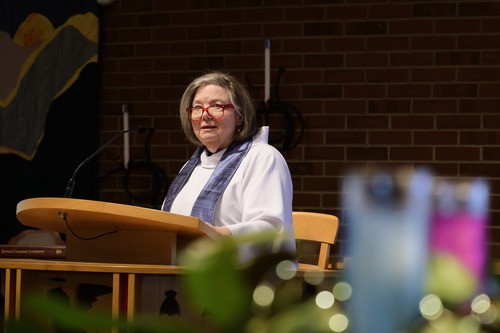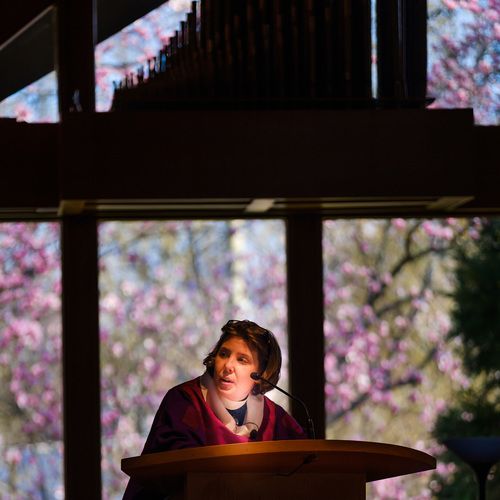sermons & Illuminations
"The voice of God rings through the ages." Rev. Kelly Kirby
Meet Our Clergy


The Rev. Kelly Kirby
Rector
The Rev. Suzanne Barrow
Dir. Congregational Life

The Rev. Jan Scholtz
Deacon
Listen to Sermons
Click on the links for SERMON to listen.
All are videos or mp3 audio files, unless the link says “Text” or “PDF."


Christ and the Woman of Samaria at the Well (c.1640-c.1641), oil painting on canvas by Giovanni Francesco Barbieri, known as Guercino (1591-1666). Thyssen-Bornemisza Museum, Madrid.
Read the Illuminations
Illuminations on the Lectionary readings for Lent 3A, Sunday, March 8, 2026
First Reading: Exodus 17:1-7
Sunday’s readings speak about thirst. We hear about the thirsty Israelites following Moses in the desert, and we look on as Jesus stops for water and rest in a Samaritan town and has an intriguing conversation with a local woman. When we face such basic needs as hunger and thirst, it’s all too easy for us to forget to be thankful for the blessings we have already received. Our first reading from Exodus finds the people grateful that God has provided manna to ease their hunger. But now they are angry because they still have no water. They complain that they were better off in slavery in Egypt than dying in the desert. Moses is just about out of patience with them, but God provides a miracle to quench their thirst.
Psalm: Psalm 95
The 95th Psalm begins with the joyful hymn of praise that we also know as the Venite, a familiar reading in Morning Prayer, which begins “Come, let us sing to the Lord.” Its grateful tone changes key in the eighth verse, though, when the Psalmist recalls the events that we heard in the Exodus reading. Because the thirsty, angry people turned their hearts from God and put God to the test, he imagines, these ungrateful actions drove God to “loathe” them and leave them to wander for 40 years in the desert.
Second Reading: Romans 5:1-11
Even though we all sin, Paul writes to the people of the church in Rome, we are nevertheless justified through faith and saved through Jesus’s death on the cross. This congregation has known suffering. Its Jewish Christian members were forced into exile and had only recently returned; now the faith of the entire congregation puts them all at risk. Even so, Paul assures them, their suffering gives them the opportunity to learn endurance and build their character through hope in the love that God pours into their hearts through the Spirit.
Gospel: John 4:5-42
Jesus was tired and thirsty after a long journey. Returning from Jerusalem to Galilee (a journey that we hear about only in John’s Gospel), he decided to pass through the country of the Samaritans, even though they were not on good terms with their Jewish neighbors. Stopping at a village well, Jesus struck up a conversation with a Samaritan woman, asking her for a drink. These actions surprised her, as Jewish men of those times weren’t likely to engage with Samaritans, much less Samaritan women. Then his conversation surprised her even more, as he promised her the unending “living water” of God’s spirit, foretold an end to the differences between their people, and declared himself the Messiah.
First Reading: Exodus 17:1-7
Sunday’s readings speak about thirst. We hear about the thirsty Israelites following Moses in the desert, and we look on as Jesus stops for water and rest in a Samaritan town and has an intriguing conversation with a local woman. When we face such basic needs as hunger and thirst, it’s all too easy for us to forget to be thankful for the blessings we have already received. Our first reading from Exodus finds the people grateful that God has provided manna to ease their hunger. But now they are angry because they still have no water. They complain that they were better off in slavery in Egypt than dying in the desert. Moses is just about out of patience with them, but God provides a miracle to quench their thirst.
Psalm: Psalm 95
The 95th Psalm begins with the joyful hymn of praise that we also know as the Venite, a familiar reading in Morning Prayer, which begins “Come, let us sing to the Lord.” Its grateful tone changes key in the eighth verse, though, when the Psalmist recalls the events that we heard in the Exodus reading. Because the thirsty, angry people turned their hearts from God and put God to the test, he imagines, these ungrateful actions drove God to “loathe” them and leave them to wander for 40 years in the desert.
Second Reading: Romans 5:1-11
Even though we all sin, Paul writes to the people of the church in Rome, we are nevertheless justified through faith and saved through Jesus’s death on the cross. This congregation has known suffering. Its Jewish Christian members were forced into exile and had only recently returned; now the faith of the entire congregation puts them all at risk. Even so, Paul assures them, their suffering gives them the opportunity to learn endurance and build their character through hope in the love that God pours into their hearts through the Spirit.
Gospel: John 4:5-42
Jesus was tired and thirsty after a long journey. Returning from Jerusalem to Galilee (a journey that we hear about only in John’s Gospel), he decided to pass through the country of the Samaritans, even though they were not on good terms with their Jewish neighbors. Stopping at a village well, Jesus struck up a conversation with a Samaritan woman, asking her for a drink. These actions surprised her, as Jewish men of those times weren’t likely to engage with Samaritans, much less Samaritan women. Then his conversation surprised her even more, as he promised her the unending “living water” of God’s spirit, foretold an end to the differences between their people, and declared himself the Messiah.
Dimensions of Faith Lectures
Dimensions of Faith invites thinkers and writers to explore the interface of religion and culture, as we continue as a parish to challenge our minds and renew our spirits.
Upcoming Speakers: Jeff Chu, October 11, 2026
Previous Speakers Include:
Nadia Bolz-Weber / Diana Butler Bass / Sarah Bessey / Steve Crump Ruby Sales / Dr. Amy-Jill Levine / Marcus Borg / Sara Miles
Robert Putnam / John Dominic Crossan / Brian McLaren / Scott Gunn
John Philip Newell / Silas House/Bishop Marianne Budde / Elizabeth Schrader-Polzcer / John Dear / Dr. Lewis Brogdon / Bob Hower and Ted Wathen
Upcoming Speakers: Jeff Chu, October 11, 2026
Previous Speakers Include:
Nadia Bolz-Weber / Diana Butler Bass / Sarah Bessey / Steve Crump Ruby Sales / Dr. Amy-Jill Levine / Marcus Borg / Sara Miles
Robert Putnam / John Dominic Crossan / Brian McLaren / Scott Gunn
John Philip Newell / Silas House/Bishop Marianne Budde / Elizabeth Schrader-Polzcer / John Dear / Dr. Lewis Brogdon / Bob Hower and Ted Wathen

